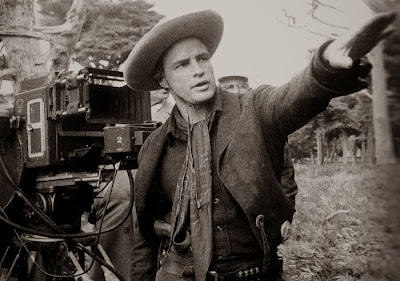The production began life at Brando's own production company, Pennebaker, named for his late mother's maiden name. Originally a young upstart named Stanley Kubrick, fresh off his WWI anti-war flick Paths of Glory, was inked to direct, but conflicts over casting during script conferences at Brando's home high atop Mullholland Drive, drove Stanley away to accept another troubled picture, Spartacus which star and producer {do you see a trend?} Kirk Douglas was filming in the nearby hills at Universal. One of the conflicts was over who should play the character of Dad Longworth, partner and father-figure to Brando's Rio {nicknamed Kid} in the movie. Kubrick wanted Spencer Tracy {imagine that potential screen team !}, while Brando wanted his friend and former co-star Karl Malden. Well it was Marlon's company so Marlon won and Stanley walked.
It must have been the story of One-Eyed Jacks that intrigued Brando, as it deals with the conflict of Dad's character with the Kid's, who start out as outlaws together and end up as bitter rivals as a result of Malden leaving Brando on top a mountain ridge to face the music after they are chased by the law for robbing banks. Brando's Kid does time in a Mexican jail, escapes, and goes looking for the man who left him high and dry. When he gets to where Malden had been hiding for several years, he finds that Dad is sheriff of a small northern California town. He has married a Mexican woman with a young daughter by a previous marriage, but Brando's Kid not only wants his revenge on Malden's Dad, he wants the young step-daughter as well. It is no secret that Brando had little use for his own father, a bullying sort, when young Bud {as Brando was known to family and friends} was in his wonder years in the midwest. In Last Tango In Paris there is a moment when Maria Schnieder's Jeanne asks him why he doesn't go back to America, and Brando recalls bad family relations. Or as his character Paul says "I can't remember many good things." Neither could Bud Brando in real or reel life.
When filming was finally finished 6 months late and some $4-5 million over budget, Brando's cut was four hours and forty two minutes. Unable to cut further, Brando walked away from the cutting and Paramount took over and released the film at two hours and twenty one minutes in March 1961. As producer Frank Rosenberg said "It wasn't a movie, it was a way of life." By that time Brando's The Fugitive Kind {filmed after, but released before One-Eyed Jacks} had flopped. It would be Brando's first. Jacks would be his second financial failure in a row with Mutiny on the Bounty looming next. In fact, Brando would go from flop to flop all through the '60s, and it was not until a little movie called The Godfather that Brando would bring him back from bankable oblivion and return him to Oscar glory. The photography by Charles Lang, Jr was Oscar nominated and is truly stunning. The bad thing about any print one see's of this film {it is in the public domain} is that it doesn't do the cinematography justice. It may be the most beautiful western this side of Shane. The music score by Hugo Friedhofer is first rate with nice motifs for individual characters and a touch of authenticity in it's flavor. And Bud the director was nominated for a Directors' Guild award. This I find may be the most remarkable thing about this damned, neglected western. That other directors would recognize the fine work this method actor, who at various times had driven their own to distraction, had accomplished. It didn't recover it's costs. Brando never attempted directing again.





